练习题
《中医统计学》习题及答案
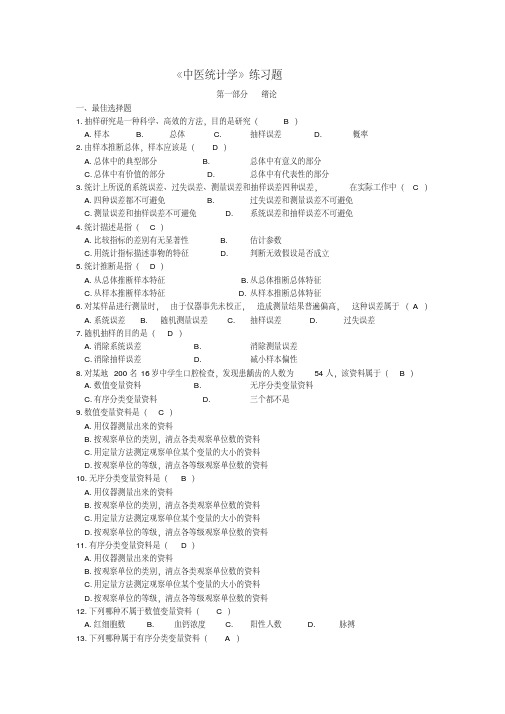
《中医统计学》练习题第一部分绪论一、最佳选择题1.抽样研究是一种科学、高效的方法,目的是研究( B )A.样本B.总体C.抽样误差D.概率2.由样本推断总体,样本应该是( D )A.总体中的典型部分B.总体中有意义的部分C.总体中有价值的部分D.总体中有代表性的部分3.统计上所说的系统误差、过失误差、测量误差和抽样误差四种误差,在实际工作中( C )A.四种误差都不可避免B.过失误差和测量误差不可避免C.测量误差和抽样误差不可避免D.系统误差和抽样误差不可避免4.统计描述是指( C )A.比较指标的差别有无显著性B.估计参数C.用统计指标描述事物的特征D.判断无效假设是否成立5.统计推断是指( D )A.从总体推断样本特征B.从总体推断总体特征C.从样本推断样本特征D.从样本推断总体特征6.对某样品进行测量时,由于仪器事先未校正,造成测量结果普遍偏高,这种误差属于( A )A.系统误差B.随机测量误差C.抽样误差D.过失误差7.随机抽样的目的是( D )A.消除系统误差B.消除测量误差C.消除抽样误差D.减小样本偏性8.对某地200名16岁中学生口腔检查,发现患龋齿的人数为54人,该资料属于( B )A.数值变量资料B.无序分类变量资料C.有序分类变量资料D.三个都不是9.数值变量资料是( C )A.用仪器测量出来的资料B.按观察单位的类别,清点各类观察单位数的资料C.用定量方法测定观察单位某个变量的大小的资料D.按观察单位的等级,清点各等级观察单位数的资料10.无序分类变量资料是( B )A.用仪器测量出来的资料B.按观察单位的类别,清点各类观察单位数的资料C.用定量方法测定观察单位某个变量的大小的资料D.按观察单位的等级,清点各等级观察单位数的资料11.有序分类变量资料是( D )A.用仪器测量出来的资料B.按观察单位的类别,清点各类观察单位数的资料C.用定量方法测定观察单位某个变量的大小的资料D.按观察单位的等级,清点各等级观察单位数的资料12.下列哪种不属于数值变量资料( C )A.红细胞数B.血钙浓度C.阳性人数D.脉搏13.下列哪种属于有序分类变量资料( A )A.治疗痊愈、有效、无效人数B.各血型人数C.白细胞分类百分比D.贫血和不贫血人数二、判断题1.统计工作的主要内容是对资料进行统计分析。
填空专项练习题
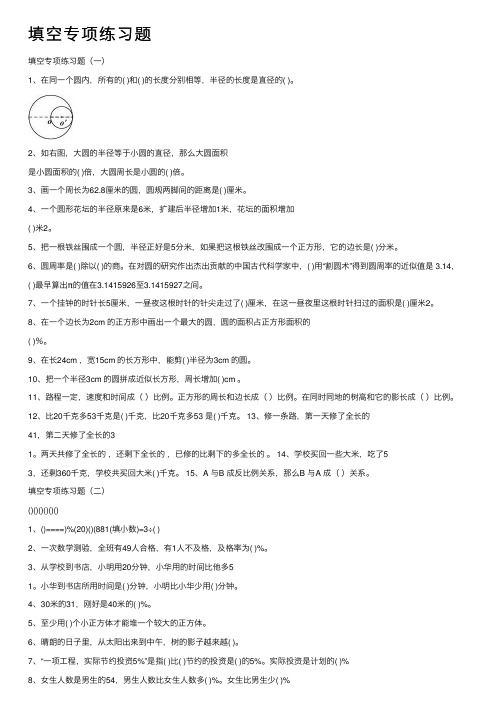
填空专项练习题填空专项练习题(⼀)1、在同⼀个圆内,所有的( )和( )的长度分别相等,半径的长度是直径的( )。
2、如右图,⼤圆的半径等于⼩圆的直径,那么⼤圆⾯积是⼩圆⾯积的( )倍,⼤圆周长是⼩圆的( )倍。
3、画⼀个周长为62.8厘⽶的圆,圆规两脚间的距离是( )厘⽶。
4、⼀个圆形花坛的半径原来是6⽶,扩建后半径增加1⽶,花坛的⾯积增加( )⽶2。
5、把⼀根铁丝围成⼀个圆,半径正好是5分⽶,如果把这根铁丝改围成⼀个正⽅形,它的边长是( )分⽶。
6、圆周率是( )除以( )的商。
在对圆的研究作出杰出贡献的中国古代科学家中,( )⽤“割圆术”得到圆周率的近似值是 3.14,( )最早算出π的值在3.1415926⾄3.1415927之间。
7、⼀个挂钟的时针长5厘⽶,⼀昼夜这根时针的针尖⾛过了( )厘⽶,在这⼀昼夜⾥这根时针扫过的⾯积是( )厘⽶2。
8、在⼀个边长为2cm 的正⽅形中画出⼀个最⼤的圆,圆的⾯积占正⽅形⾯积的( )%。
9、在长24cm ,宽15cm 的长⽅形中,能剪( )半径为3cm 的圆。
10、把⼀个半径3cm 的圆拼成近似长⽅形,周长增加( )cm 。
11、路程⼀定,速度和时间成()⽐例。
正⽅形的周长和边长成()⽐例。
在同时同地的树⾼和它的影长成()⽐例。
12、⽐20千克多53千克是( )千克,⽐20千克多53 是( )千克。
13、修⼀条路,第⼀天修了全长的41,第⼆天修了全长的31。
两天共修了全长的,还剩下全长的,已修的⽐剩下的多全长的。
14、学校买回⼀些⼤⽶,吃了53,还剩360千克,学校共买回⼤⽶( )千克。
15、A 与B 成反⽐例关系,那么B 与A 成()关系。
填空专项练习题(⼆)()()()()()()1、()====)%(20)()(881(填⼩数)=3÷( )2、⼀次数学测验,全班有49⼈合格,有1⼈不及格,及格率为( )%。
3、从学校到书店,⼩明⽤20分钟,⼩华⽤的时间⽐他多51。
化简求值专项练习20题带答案

化简求值专项练习题1.先化简,再求值:2(3a2﹣ab)﹣3(2a2﹣ab),其中a=﹣2,b=3.2.先化简,再求值:6a2b﹣(﹣3a2b+5ab2)﹣2(5a2b﹣3ab2),其中a=﹣2,b=.3.先化简,再求值:3x2y2﹣[5xy2﹣(4xy2﹣3)+2x2y2],其中x=﹣3,y=2.4.先化简,再求值:5ab2+3a2b﹣3(a2b﹣ab2),其中a=2,b=﹣1.5.先化简,再求值:2x2﹣y2+(2y2﹣x2)﹣3(x2+2y2),其中x=3,y=﹣2.6.先化简,再求值:5x2﹣[x2+(5x2﹣2x)﹣2(x2﹣3x)],其中x=.7.先化简,再求值:(6a2﹣6ab﹣12b2)﹣3(2a2﹣4b2),其中a=﹣,b=﹣8.8.先化简,再求值:x2y﹣(2xy﹣x2y)+xy,其中x=﹣1,y=﹣2.9.先化简,再求值:5(xy+3x2﹣2y)﹣3(xy+5x2﹣2y),其中x=,y=﹣1.10.当|a|=3,b=a﹣2时,化简代数式1﹣{a﹣b﹣[a﹣(b﹣a)+b]}后,再求这个代数式的值.11.先化简,再求值:a2﹣(2a2+2ab﹣b2)+(a2﹣ab﹣b2),其中a=3,b=﹣2.12.先化简,再求值:3a2﹣(2ab+b2)+(﹣a2+ab+2b2),其中a=﹣1,b=2.13.先化简再求值,已知a=﹣2,b=﹣1,c=3,求代数式5abc﹣2a2b﹣[(4ab2﹣a2b)﹣3abc]的值.14.先化简,再求值:﹣2(ab﹣3a2)﹣[a2﹣5(ab﹣a2)+6ab],其中a=2,b=﹣3.15.先化简,再求值:3a3﹣[a3﹣3b+(6a2﹣7a)]﹣2(a3﹣3a2﹣4a+b)其中a=2,b=﹣1,16.先化简,再求值:(5a2b+4b3﹣2ab2+3a3)﹣(2a3﹣5ab2+3b3+2a2b),其中a=﹣2,b=3.17.先化简,再求值:(a2﹣3ab﹣2b2)﹣(a2﹣2b2),其中,b=﹣8.18.先化简,再求值:8mn﹣[4m2n﹣(6mn2+mn)]﹣29mn2,其中m=﹣1,n=.19.化简求值:3(x3﹣2y2﹣xy)﹣2(x3﹣3y2+xy),其中x=3,y=1.20.先化简再求值:3x2y﹣[2xy2﹣2(xy﹣x2y)+xy]+3xy2,其中x=,y=﹣5.整式化简求值90题参考答案:1.原式=6a2﹣2ab﹣6a2+3ab=ab,当a=﹣2,b=3时,原式=ab=﹣2×3=﹣6.2.原式=6a2b+3a2b﹣5ab2﹣10a2b+6ab2=﹣a2b+ab2 ,把a=﹣2,b=代入上式得:原式=﹣(﹣2)2×+(﹣2)×2=﹣2﹣=﹣2.3.原式=3x2y2﹣5xy2+4xy2﹣3﹣2x2y2=x2y2﹣xy2﹣3当x=﹣3,y=2时,原式=454.原式=5ab2+3a2b﹣3a2b+2ab2=7ab2.当a=2,b=﹣1时,原式=7×2×(﹣1)2=14.5.原式=2x2﹣y2+2y2﹣x2﹣3x2﹣6y2=﹣2x2﹣5y2.当x=3,y=﹣2时,原式=﹣18﹣20=﹣38.6.原式=5x2﹣(x2+5x2﹣2x﹣2x2+6x)=x2﹣4x当x=时,原式=7.原式=6a2﹣6ab﹣12b2﹣6a2+12b2=﹣6ab,当a=﹣,b=﹣8时,原式=﹣6×(﹣)×(﹣8)=﹣24.8.原式=x2y﹣2xy+x2y+xy=2x2y﹣xy,当x=﹣1,y=﹣2时,原式=2×(﹣1)2×(﹣2)﹣(﹣1)×(﹣2)=﹣6.9.原式=5xy+15x2﹣10y﹣3xy﹣15x2+6y=2xy﹣4y,当x=,y=﹣1时,原式=2××(﹣1)﹣4×(﹣1)=3.10.原式=1+a+b;当a=3时,b=1,代数式的值为5;当a=﹣3时,b=﹣5,代数式的值为﹣7.a2﹣(2a2+2ab﹣b2)+(a2﹣ab﹣b2)11.原式==a2﹣2a2﹣2ab+b2+a2﹣ab﹣b2=﹣a2﹣3ab.当a=3,b=﹣2时,原式=﹣×32﹣3×3×(﹣2)=﹣3+18=1512.原式=2a2﹣ab+b2当a=﹣1,b=2.原式=2a2﹣ab+b2=2×(﹣1)2﹣(﹣1)×2+22= 813.原式=5abc﹣2a2b﹣4ab2+a2b+3abc=8abc﹣a2b﹣4ab2;a=﹣2,b=﹣1,c=3时,原式=8×2×1×3﹣4×(﹣1)﹣4×(﹣2)×1=60.14.原式=﹣2ab+6a2﹣(a2﹣5ab+5a2+6ab)=﹣2ab+6a2﹣a2+5ab﹣5a2﹣6ab=﹣3ab;当a=2,b=﹣3时,原式=﹣3×2×(﹣3)=1815.原式=3a3﹣[a3﹣3b+6a2﹣7a]﹣2a3+6a2+8a﹣2b=3a3﹣a3+3b﹣6a2+7a﹣2a3+6a2+8a﹣2b=15a+b当a=2,b=﹣1时,原式=15×2﹣1=29.16.原式=5a2b+4b3﹣2ab2+3a3﹣2a3+5ab2﹣3b3﹣2a2b=a3+3a2b+3ab2+b3,当a=﹣2,b=3时,原式=(﹣2)3+3×(﹣2)2×3+3×(﹣2)×32+33=﹣8+36﹣54+27=1.17.原式=a2﹣3ab﹣2b2﹣a2+2b2=﹣3ab,当,b=﹣8时,原式=﹣3×()×(﹣8)=﹣12.18.原式=8mn﹣[4m2n﹣6mn2﹣mn]﹣29mn2=8mn﹣4m2n+6mn2+mn﹣29mn2=9mn﹣4m2n﹣23mn2当m=﹣1,n=时,原式=9×(﹣1)×﹣4×12×﹣23×(﹣1)×=﹣﹣2+=﹣.19.原式=3x3﹣6y2﹣3xy﹣3x3+6y2﹣2xy=﹣5xy,当x=3,y=1时,原式=﹣5×3×1=﹣15.20.原式=3x2y﹣[2xy2﹣(2xy﹣3x2y)+xy]+3xy2=3x2y﹣(2xy2﹣2xy+3x2y+xy)+3xy2=3x2y﹣2xy2+2xy﹣3x2y﹣xy+3xy2=xy+xy2,当x=,y=﹣5时,原式=×(﹣5)+×25=.。
整式的乘除测试题练习8套(含答案)
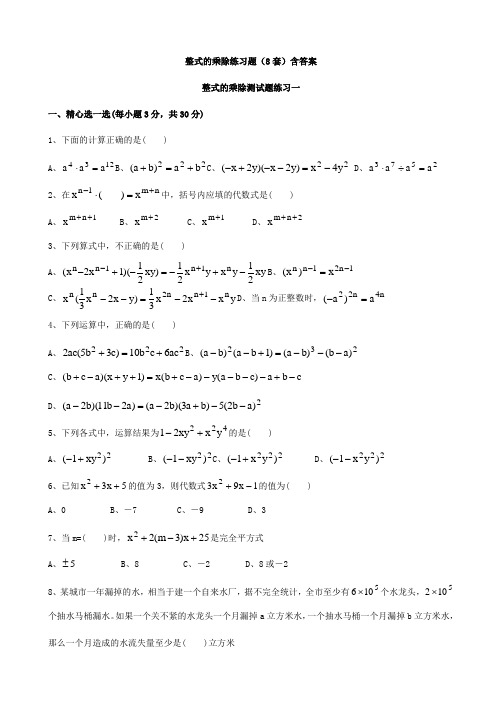
整式的乘除练习题(8套)含答案整式的乘除测试题练习一一、精心选一选(每小题3分,共30分) 1、下面的计算正确的是( )A 、1234a a a =⋅B 、222b a )b a (+=+C 、22y 4x )y 2x )(y 2x (-=--+-D 、2573a a a a =÷⋅ 2、在n m 1n x )(x +-=⋅中,括号内应填的代数式是( )A 、1n m x ++B 、2m x +C 、1m x +D 、2n m x ++ 3、下列算式中,不正确的是( )A 、xy 21y x y x 21)xy 21)(1x2x (n 1n 1n n -+-=-+-+-B 、1n 21n n x )x (--= C 、y x x 2x31)y x 2x 31(x n 1n n 2nn --=--+D 、当n 为正整数时,n 4n 22a )a (=- 4、下列运算中,正确的是( )A 、222ac 6c b 10)c 3b 5(ac 2+=+B 、232)a b ()b a ()1b a ()b a (---=+--C 、c b a )c b a (y )a c b (x )1y x )(a c b (-+-----+=++-+D 、2)a b 2(5)b a 3)(b 2a ()a 2b 11)(b 2a (--+-=-- 5、下列各式中,运算结果为422y x xy 21+-的是( )A 、22)xy 1(+-B 、22)xy 1(--C 、222)y x 1(+-D 、222)y x 1(-- 6、已知5x 3x 2++的值为3,则代数式1x 9x 32-+的值为( ) A 、0 B 、-7 C 、-9 D 、3 7、当m=( )时,25x )3m (2x 2+-+是完全平方式 A 、5± B 、8 C 、-2 D 、8或-28、某城市一年漏掉的水,相当于建一个自来水厂,据不完全统计,全市至少有5106⨯个水龙头,5102⨯个抽水马桶漏水。
乘法练习题

5×7=
9×1=
2×4=
1×7=
9×4=
对题对题
乘法练习题(十)
8×2=
3×6=
3×4=
5×4=
3×8=
3×5=
3×1=
1×9=
4×4=
1×4=
7×7=
4×5=
9×2=
3×2=
2×2=
1×8=
8×9=
2×6=
7×5=
1×3=
4×7=
6×7=
3×9=
6×4=
9×8=
8×4=
4×3=
7×9=
6×2=
5×8=
3×5=
9×5=
6×4=
7×2=
4×8=
6×2=
5×3=
1×1=
4×4=
7×9=
6×7=
8×5=
4×7=
6×9=
2×1=
7×1=
8×6=
5×5=
6×3=
3×9=
3×8=
4×1=
9×2=
8×8=
8×1=
6×6=
6×8=
6×1=
7×4=
1×9=
9×7=
2×3=
3×6=
9×7=
2×9=
对题对题
乘法练习题(十六)
1×2=
5×7=
对题对题
乘法练习题(十七)
7×5=
4×9=
2×1=
8×5=
6×2=
2×7=
3×8=
4×5=
6×1=
9×8=
8×9=
1×6=
1×1=
4×4=
3×7=
6×7=
7×9=
9×5=
30个练习题及答案
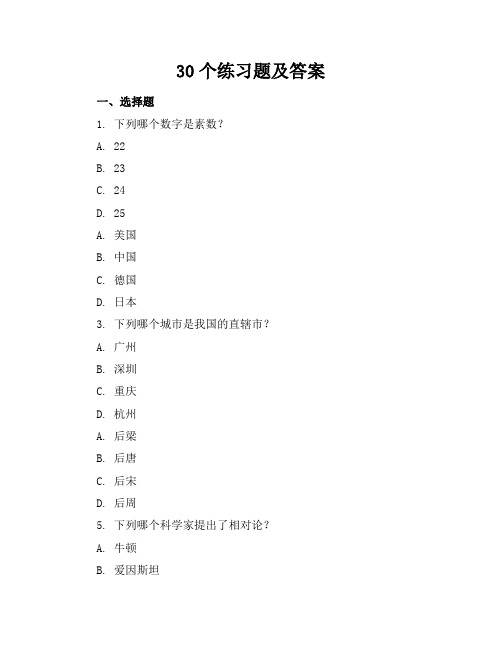
30个练习题及答案一、选择题1. 下列哪个数字是素数?A. 22B. 23C. 24D. 25A. 美国B. 中国C. 德国D. 日本3. 下列哪个城市是我国的直辖市?A. 广州B. 深圳C. 重庆D. 杭州A. 后梁B. 后唐C. 后宋D. 后周5. 下列哪个科学家提出了相对论?A. 牛顿B. 爱因斯坦C. 玛丽·居里D. 伽利略二、填空题6. 我国国旗上的五颗星代表______。
7. 地球的南极洲属于______洲。
8. 一年有______个月。
9. 人体内最大的消化腺是______。
10. “精卫填海”这个故事出自______。
三、判断题11. 长江是中国最长的河流。
()12. 企鹅生活在北极。
()13. 鸡蛋是鸡的排泄物。
()14. 电脑病毒是一种生物病毒。
()15. 太阳是宇宙中心。
()四、简答题16. 请简述水的三态变化。
17. 请列举三种可再生能源。
18. 请解释什么是光合作用。
19. 请简要介绍我国四大发明。
20. 请说明地球自转和公转的区别。
五、计算题21. 计算:5² 3²22. 计算:(8 + 6) × 3 ÷ 223. 计算:4.8 ÷ 1.224. 计算:√(49 + 81)25. 计算:3 × (7 4) + 2²六、应用题26. 小明有20元钱,他买了一本书花了15元,他还剩下多少钱?27. 一辆汽车行驶100公里,平均速度为60公里/小时,求行驶时间。
28. 一个长方形的长是10厘米,宽是6厘米,求它的面积。
29. 一桶水重50千克,倒出1/4后,还剩下多少千克?30. 一家工厂生产一批产品,每件产品成本为200元,售价为300元,共生产了100件,求总利润。
七、完形填空题31. 阅读下面的短文,从下列选项中选择最恰当的词语填空。
古人云:“熟能生巧。
”这句话告诉我们,只有通过不断的练习,才能达到熟练的程度。
中医学习题选择1

《中医学》练习题中医基础部分一、单项选择题(每题后有A B C D E五个备选答案请选择一个您认为最合适的答案)1.五脏与六腑之间的关系,主要是:A 经络的联结关系B 阴阳表里相互配合的关系C 功能与物质的关系D 受纳与化生的关系E 以上都不是2.卫气是:A 先天之气B 积于胸中之气C 行于脉外之气D 行于脉中之气E 以上都不是3.元气的功能是:A 保护体表,抵御外邪B 营养脏腑组织C 激发和推动脏腑功能活动D 参与血行E 温润皮肤肌肉4.积于胸中之气是:A 宗气B 营气C 卫气D 元气E 正气5.藏于肾中之气是:A 宗气B 营气C 卫气D 元气E 正气6.宗气的生成来源是:A 先天之精与吸入之清气B 先天之精气与后天之精气C 水谷之精气与吸入之清气D 吸入之清气与肾中之精气E 以上都不是7.六淫是指:A 六气B 疠气、疫气、戾气、异气、毒气、乖戾之气C 内风、内寒、内湿、内燥、内火、内热D 风、寒、暑、湿、燥、火六种外感病邪E 以上都不是8.伤风患者,其症状常首先表现在A 肺B 肝C 脾D 上E 下9.风为百病之长,是指风邪常为下列何类病变的主要致病因素:A 内伤病B 外感病C 上部病D 下部病E 以上都不是10.湿为下列何季的主气:A 春季B 夏季C 秋季D 冬季E 以上都不是11.邪正盛衰病理变化中的"虚"是指:A 体质虚弱的患者B 正气不足,抗邪无力C 脏腑功能低下D 以正气虚损为矛盾的主要方面的一种病理反映E 以上都不是12.预防的意义是:A 调养身体,以提高抗病能力B 防止疾病的发生与发展C 防止疾病侵入人体D 加强锻炼,增强体质E 以上都不是13.被称为"后天之本"的是:A 心B 肝C 脾D 肺E 肾14.被称为"先天之本"的是:A 心B 肝C 脾D 肺E.肾15.暑邪的性质和致病特点之一是:A 易致肿疡B 易伤肺C.易犯脾D 多夹湿E 主收引16.舌体瘦小嫩红而有裂纹,多属:A 阳虚B 血虚不润C 热盛津伤D 阴虚E 以上都不是17.藏象学说的主要特点,是以下列哪项为中心的整体观:A 命门B 五脏C 六腑D 脑E 以上都不是18.盗汗的病机主要在于:A 肺卫失调B 阴虚阳亢C 阳气虚衰D 正邪交争E 以上都不是19.五更泻,下利清稀,夹有不消化食物,为;A 脾虚不运B 饮食积滞C 寒湿内蕴D 脾肾阳虚E 肝郁脾虚20.患者神疲乏力,自汗,动则加剧,易患感冒,此为:A 卫气虚弱B 肺气虚弱C 中气虚衰D营卫不和E 以上都不是21.患者神疲少气,咳喘无力,动则气短,声音低微,自汗,面色恍白,舌质淡,脉虚弱,可拟诊为:A 脾气虚弱B 肾阳虚C 肺气虚D 肺肾气虚E 心肺气虚22.气陷主要由下列哪项所致:A 宗气下陷B 中气下陷C 元气下陷D 营气下陷E 卫气下陷23.辨别表证与里证,应以哪项为依据:A 恶寒B 肢冷C 腹痛D 脉弱E 以上都不是24.面色淡白而消瘦,为:A 阳气不足B 营血亏虚C 阳气暴脱D 脾虚湿盛E 宗气不足25.下列哪项是寒证的主要临床表现:A 畏寒喜暖B 无汗C 头痛D 水肿E 口渴饮水不多26.心悸气短与下列哪项同见对诊断心阳虚最有意义:A 身疲乏力B 自汗C 形寒肢冷D 头晕目眩E 脉虚无力27.患者咳嗽痰多,色白而稀,易于咯出,胸闷气喘痰鸣,舌淡苔白腻,脉弦滑.可拟诊为:A 湿痰证B 寒痰证C 寒邪范肺证D 痰湿阻肺证E 脾肺气虚证28.诊断为食滞胃脘证,下列哪项是错误的:A 脘腹灼痛B 厌食C 嗳气D 呕吐酸腐E 苔厚腻,脉滑29.对脾气虚和脾不统血具有鉴别意义的是:A 面色萎黄B 食少腹满C 便溏D 少气懒言E 便血尿血30.对肾气虚和肾不纳气具有鉴别意义的是:A 腰膝酸软B 耳鸣耳聋C 气喘D 少气懒言E 舌淡苔白31.少气,活动时加剧多见于:A 气虚证B 气陷证C 气逆证D 气滞证E 阴虚证32.崩漏且伴见少气懒言,面色苍白,脉细弱,多为:A 气滞血瘀B 气血两虚C 气虚失血D 气随血脱E 气虚血瘀33.肺气不足可见:A 呃逆B 少气C 呛咳D 太息E 顿咳34.从秋到冬的气候变化属于:A 阴消阳长B 阳消阴长C 阴阳均长D 阴阳均消E 以上都不是35.热极生风表现正确的是:A 高热烦渴,抽畜项强,角弓反张B 眩晕欲仆,头痛如挚C 肢体麻木D 肢体震颤E 以上都不是36.腑的功能主要是:A 消化、吸收、输布、排泄B 藏精气C 联络五脏D 化物E 藏神37.脾主运化包括:A 运化气血和水湿B 运化水谷和痰欲C 运化水谷和水湿D 运化气血和水谷E 运化精气和血液38.肾藏精是指藏:A 先天之精B 水谷之精气C 后天之精D 脏腑之精E 先天之精合后天之精39.先天之精来源于:A 父母B 饮食水谷化生C 命门D 气血E 津液40.三焦中“中焦”包括哪些脏腑:A 脾胃B 肝肾C 心肾D 肺脾E 心肺41.与血的生成、代谢有关的脏是:A 心、肝、肾、脾B 肺、脾、心C 肺、脾、肾D 肺、脾、肾、心E 肺、肝、肾42.从临床看,命门火衰的病人,其病证与以下哪类病证多属一致:A 心阳不足证B 肾阳不足证C 脾阳不足证D 肾阴不足证E 以上都不是43.后天之精的主要功能是:A 生长、发育、生殖B 维持人体生命活动C 化生气血D 主呼吸语言E 都不是44.元气来源于:A 水谷之气行于脉外B 呼吸之气+水谷之气C 先天之气+后天之气D 水谷之气行于脉中E 先天之精化生+后天之气补充45.五体中皮毛属哪脏所主:A 心B 肝C 脾D 肺E 肾46.舌苔黄属:A 虚证B 实证C 寒证D 表热证E 里热证47.剥苔常反应:A 热证B 寒证C 伤阴D 气虚E 血虚48.病人因情志不舒,引起胸胁胀痛,腹满便泄等证者,证属:A 肝气郁结B 胃气不降C 肝脾不和D 肝气犯胃E 脾失健运49.舌质红、苔黄黑干属:A 寒极B 虚证C 实证D 热极E 都不是59.多食而饥、消瘦多:A 胃火盛B 肝火盛C 心火盛D 肺火盛E 阴虚火旺50.刺痛固定不移多:A 寒证B 热证C 血瘀D 气滞E 虚证51.大便脓血多:A 寒湿B 痰湿C 湿热D 气滞E 气虚52.以下哪一证候不属于寒证:A 畏寒喜暖B 四肢不温C 尿黄便结D 脘腹冷痛E 脉迟53.实证是指:A 正气不足B 邪气不足C 正气和邪气都不足D 正气不足,邪气有余E 邪气有余54.大肠的传导变化作用,是胃的降浊功能的延伸,同时也与下列哪一脏的肃降功能有关:A 脾B 心C 肝D 肾E 肺55.血热最易影响以下哪一脏:A 心B 肝C 脾D 肺E 肾56.口咽干燥、口渴欲饮、小便短黄、大便干结、舌红、苔少且干、脉细,属以下什么病证:A 阴虚B 津液不足C 血虚D 气虚E 血瘀57.心病虚证辨证共同症状是:A 心悸B 失眠C 气短D 声低E 头昏58.咳嗽的病机主要是:A 肺失宣降B 肺阴虚C 肺气虚D 肺伤津液E 脾失健运59.肺肾气虚与肺气虚具有鉴别意义的症状是:A 咳嗽无力B 气短喘促C 气低息短D 咯痰无力E 少气懒言60.中医治则中“标本缓急”的具体应用以下哪一项是错误的:A 先治标后治本B 急则治标C 缓则治本D 标本同治E 扶正兼祛邪61.以下哪一种是中药的四气:A 寒、热、平、淡B 酸、辛、苦、咸C 升降浮沉D 温凉沉降E 寒热温凉62.淡味药的作用是:A 行气活血解表B 高和补益C 燥湿清热D 软坚通便E 通利小便63.肾与肝的关系主要表现在以下哪一方面:A 血液和精神情志方面B 气和血的关系C 精和血的关系D 血液的生成和运行方面E 气的生成和水液的输布两个方面64.下列哪一种不是反治法:A 寒因寒用B 热因热用C 同病异治D 通因通用E 塞因塞用65.火克金是指:A 心克肺B 心克肝C 心克脾D 心克肾E 以上都不是66.肝的主要功能是:A 主疏泄,主藏血,开窍于目B 主藏血,主筋,其华在爪,开窍于目C 主疏泄,主藏血,主筋,其华在爪,开窍于目D 主藏血,主筋,其华在爪E 以上都不是67.燥的特点之一是:A 燥易伤肺B 燥易伤肝C 燥易伤肾D 燥易伤心E 以上都不是68.出现动则气喘等证多因:A 肺气虚弱B 水气凌心C 肾不纳气D 肝火犯肺E 肺肾阴虚69.痰饮的形成,多为:A 肺、脾、肾三脏功能失常B 心、肝、肾三脏功能失常C 心、肺、脾三脏功能失常D 肺、脾、肝三脏功能失常E 以上都不是70.暑邪伤人,可见到气短、乏力症状,这是由于:A 暑邪为阳邪,其性炎热B 暑邪伤人,损伤脾胃,纳食减少C 暑为挟湿,阻遏气机D 暑邪升散,伤津耗气E 以上都不是71.人体骨骼发育正常与否,主要取决于:A 肝藏血,血能充养全身,B 脾主运化水谷精微,以养周身C 肾藏精,精能生髓D 心主血脉,推动血液输送周身E 肺能形成宗气,贯心肺以行血气,奉养周身72.两种药物合用,能产生毒性、反应或副作用,这种配伍关系称为:A 相须B 相使C 相杀D 相恶E 相反73.主水之脏器是:A 肺B 脾C 肾D 三焦E 膀胱74.八纲中辨别疾病类别的纲领是:A 阴、阳B 表、里C 寒、热D 实、虚E 以上都不是75.八纲中辨别疾病邪正盛衰的纲领是:A 阴、阳B 表、里C 寒、热D 实、虚E 以上都不是76.阳证不能概括以下哪一类病证:A 表证B 热证C 实证D 寒证E 以上都不是77.脉迟与数可用以鉴别以下哪一类病证:A 表、里B 寒热C 虚实D 阴阳E 以上都不是78.在生理状态下,心火必须下降于肾.使:A 肾精充足B 肾阳不亢C 肾水不寒D 肾气不衰E 心阴不虚79.下列何脏开窍于舌:A 心B 肝C 脾D 肺E 肾80.下列何脏开窍于口:A 心B 肝C 脾D 肺E 肾二、简答题1.正治的概念。
国考行测练习100题 含答案

国考行测练习题1、0,4,5,11,14,22,()A.24B.25C.26D.273、2010年居民消费价格与2006年相比,上涨了()。
A.14.8%B.13.3%C.13.8%D.2.8%5、我们常说“屋漏偏逢连夜雨”,灾难接连而来,真是( )A.生于忧患死于安乐B.一波未平,一波又起C.麻雀虽小,五脏俱全D.要使人不知,除非己莫为6、邓小平首次正式提出“建设有中国特色社会主义”是()。
A.在党的十一届三中全会上B.在党的第十二次全国代表大会开幕词中C.在党的十二届三中全会上D.在党的第十三次全国代表大会上7、间接故意是指行为人明知自己的行为会发生危害社会的结果,并有意放任,以致发生这种结果的心理态度。
下列属于间接故意的是( )。
A.某甲在打兔子时,发现附近有一个牧童,但他还是开了枪,结果打中了牧童B.某省副省长利用职务之便,贪污公款一千余万元C.某人知道附近的山上有狼,却故意引诱一个小孩到山上去,结果小孩被狼所伤D.某工人在不知情的情况下合上了电闸,造成了正在修理机器的工友的受伤8、1/2,1/5,1/8,1/11,()A.1/14B.1/16C.1/17D.1/159、某食品加工企业向卫生局申请卫生许可证,对于该申请,卫生局经过审查后应当如何处理?( )A.如果不能当场做出许可决定,可以自主决定做出决定的期限B.如果食品加工企业符合法定卫生条件、标准、卫生局可以当场做出口头许可决定C.卫生局如果认为食品加工企业不符合卫生条件标准,可以做出不予许可的决定,无需说明理由D.卫生局如果做出不予颁发卫生许可证的决定,应当告知该食品加工企业有权申请复议或者提起行政诉讼的权利10、2010年1~5月我国对美国进出口总值约比上年同期增长()。
A.24.8%B.28.2%C.37.4%D.39.1%12、一本仅用十几万字写出中国上下五千年文明史的普及读物《中国读本》,继在我国创下累计发行1000余万册的骄人成绩后,又开始走出中国走向世界。
集合基础练习题100个
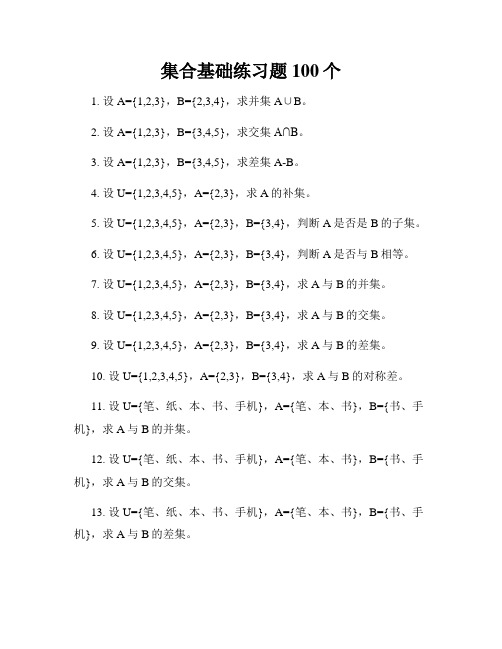
集合基础练习题100个1. 设A={1,2,3},B={2,3,4},求并集A∪B。
2. 设A={1,2,3},B={3,4,5},求交集A∩B。
3. 设A={1,2,3},B={3,4,5},求差集A-B。
4. 设U={1,2,3,4,5},A={2,3},求A的补集。
5. 设U={1,2,3,4,5},A={2,3},B={3,4},判断A是否是B的子集。
6. 设U={1,2,3,4,5},A={2,3},B={3,4},判断A是否与B相等。
7. 设U={1,2,3,4,5},A={2,3},B={3,4},求A与B的并集。
8. 设U={1,2,3,4,5},A={2,3},B={3,4},求A与B的交集。
9. 设U={1,2,3,4,5},A={2,3},B={3,4},求A与B的差集。
10. 设U={1,2,3,4,5},A={2,3},B={3,4},求A与B的对称差。
11. 设U={笔、纸、本、书、手机},A={笔、本、书},B={书、手机},求A与B的并集。
12. 设U={笔、纸、本、书、手机},A={笔、本、书},B={书、手机},求A与B的交集。
13. 设U={笔、纸、本、书、手机},A={笔、本、书},B={书、手机},求A与B的差集。
14. 设U={笔、纸、本、书、手机},A={笔、本、书},B={书、手机},求A与B的对称差。
15. 设U={男、女、学生、教师、工人},A={男、女、学生},B={学生、教师},求A与B的并集。
16. 设U={男、女、学生、教师、工人},A={男、女、学生},B={学生、教师},求A与B的交集。
17. 设U={男、女、学生、教师、工人},A={男、女、学生},B={学生、教师},求A与B的差集。
18. 设U={男、女、学生、教师、工人},A={男、女、学生},B={学生、教师},求A与B的对称差。
19. 设U={苹果、香蕉、橙子、西瓜、葡萄},A={苹果、香蕉、橙子},B={橙子、西瓜},求A与B的并集。
现代汉语练习测试题及参考答案(1)
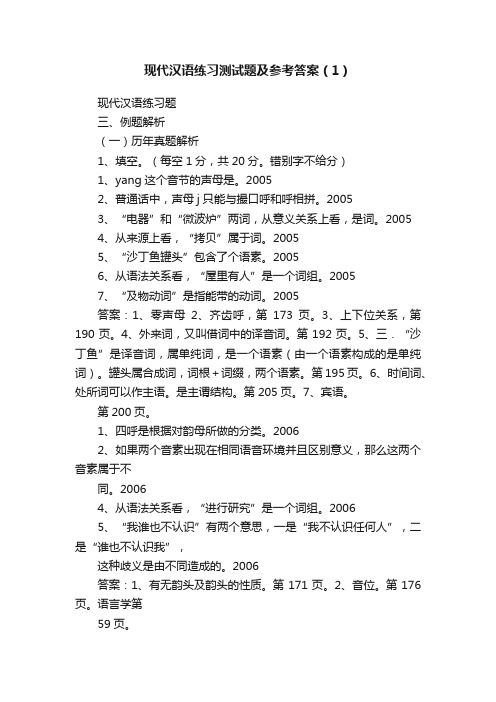
现代汉语练习测试题及参考答案(1)现代汉语练习题三、例题解析(一)历年真题解析1、填空。
(每空1分,共20分。
错别字不给分)1、yang这个音节的声母是。
20052、普通话中,声母j只能与撮口呼和呼相拼。
20053、“电器”和“微波炉”两词,从意义关系上看,是词。
20054、从来源上看,“拷贝”属于词。
20055、“沙丁鱼罐头”包含了个语素。
20056、从语法关系看,“屋里有人”是一个词组。
20057、“及物动词”是指能带的动词。
2005答案:1、零声母2、齐齿呼,第173页。
3、上下位关系,第190页。
4、外来词,又叫借词中的译音词。
第192页。
5、三.“沙丁鱼”是译音词,属单纯词,是一个语素(由一个语素构成的是单纯词)。
罐头属合成词,词根+词缀,两个语素。
第195页。
6、时间词、处所词可以作主语。
是主谓结构。
第205页。
7、宾语。
第200页。
1、四呼是根据对韵母所做的分类。
20062、如果两个音素出现在相同语音环境并且区别意义,那么这两个音素属于不同。
20064、从语法关系看,“进行研究”是一个词组。
20065、“我谁也不认识”有两个意思,一是“我不认识任何人”,二是“谁也不认识我”,这种歧义是由不同造成的。
2006答案:1、有无韵头及韵头的性质。
第171页。
2、音位。
第176页。
语言学第59页。
4、述宾结构,第198页。
5、语义结构关系(隐性语法关系),第216页。
可见通过填空考知识点、考定义。
还是要认真复习定义、知识点。
有的需要背诵。
1、普通话声母z、c、s不能与呼韵母和撮口呼韵母相拼。
2007(第171、173页,齐齿呼)2、普通话声母b的语音特征是双唇、清、塞音。
2007(第167页,不送气)3、“修”的声旁是。
2007(第180页)4、能单独构成一个词的语素是语素。
2007(第183页,成词)5、汉语中的词类是根据划分出来的,词义只起参考作用。
2007(第199页,词的语法功能)6、“帮助我的同学”的歧义是由不同造成的。
营养学基础习题
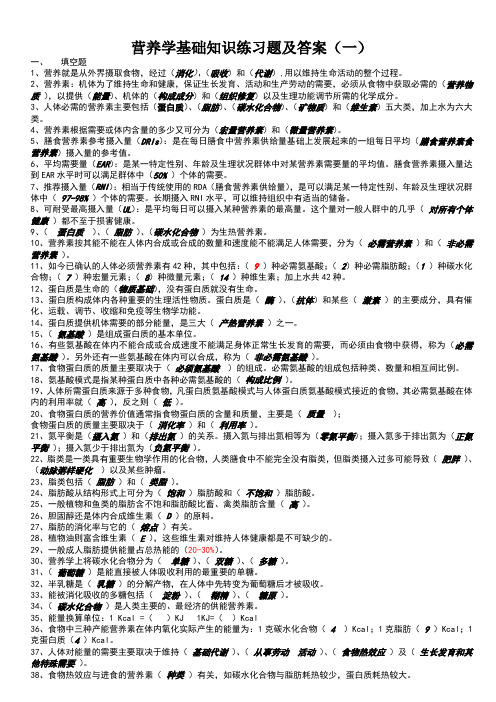
营养学基础知识练习题及答案(一)一、填空题1、营养就是从外界摄取食物,经过(消化)、(吸收)和(代谢),用以维持生命活动的整个过程。
2、营养素:机体为了维持生命和健康,保证生长发育、活动和生产劳动的需要,必须从食物中获取必需的(营养物质),以提供(能量)、机体的(构成成分)和(组织修复)以及生理功能调节所需的化学成分。
3、人体必需的营养素主要包括(蛋白质)、(脂肪)、(碳水化合物)、(矿物质)和(维生素)五大类,加上水为六大类。
4、营养素根据需要或体内含量的多少又可分为(宏量营养素)和(微量营养素)。
5、膳食营养素参考摄入量(DRIs):是在每日膳食中营养素供给量基础上发展起来的一组每日平均(膳食营养素食营养素)摄入量的参考值。
6、平均需要量(EAR):是某一特定性别、年龄及生理状况群体中对某营养素需要量的平均值。
膳食营养素摄入量达到EAR水平时可以满足群体中(50% )个体的需要。
7、推荐摄入量(RNI):相当于传统使用的RDA(膳食营养素供给量),是可以满足某一特定性别、年龄及生理状况群体中(97-98% )个体的需要。
长期摄入RNI水平,可以维持组织中有适当的储备。
8、可耐受最高摄入量(UL):是平均每日可以摄入某种营养素的最高量。
这个量对一般人群中的几乎(对所有个体健康)都不至于损害健康。
9、(蛋白质)、(脂肪)、(碳水化合物)为生热营养素。
10、营养素按其能不能在人体内合成或合成的数量和速度能不能满足人体需要,分为(必需营养素)和(非必需营养素)。
11、如今已确认的人体必须营养素有42种,其中包括:( 9 )种必需氨基酸;( 2)种必需脂肪酸;(1 )种碳水化合物;( 7 )种宏量元素;( 8)种微量元素;( 14)种维生素;加上水共42种。
12、蛋白质是生命的(物质基础),没有蛋白质就没有生命。
13、蛋白质构成体内各种重要的生理活性物质。
蛋白质是(酶)、(抗体)和某些(激素)的主要成分,具有催化、运载、调节、收缩和免疫等生物学功能。
数学练习题.doc

1.三峡水库总库容39300000000立方米,把这个数改写成亿作单位的数是( )。
2.79 的分数单位是( ),再增加( )个这样的单位正好是最小的质数。
3.在72.5%,79 ,0.7255,0.725 中,最大的数是( ),最小的数是 ( )。
4.把3米长的绳子平均分成8段,每段是全长的( ),每段长( )。
5.3 ÷( )=9:( )= =0.375=( )% (每空0.5分)6.饮料厂从一批产品中抽查了40瓶饮料,其中8瓶不合格,合格率是( ) 。
7.0.3公顷=( )米2 1800 厘米3 =( )分米32.16米 =( )厘米 3060克=( )千克8.第30届奥运会于2012年在英国伦敦举办,这一年的第一季度有( )天。
9.汽车4小时行360千米,路程与时间的比是( ),比值是( )。
10.在比例尺是1∶15000000的地图上,图上3厘米表示实际距离( )千米。
11.一枝钢笔的单价是a元,买6枝这样的钢笔需要( )元。
12.有一张长48厘米,宽36厘米的长方形纸,如果要裁成若干同样大小的.正方形而无剩余,裁成的小正方形的边长最大是( )厘米。
13.学校有8名教师进行象棋比赛,如果每2名教师之间都进行一场比赛,一共要比赛( )场。
14.如右图,如果平行四边形的面积是8平方米,那么圆的面积是( )平方米。
15.一个正方体的底面积是36 厘米 2,这个正方体的体积是( )立方厘米。
16.一个圆柱和一个圆锥的体积相等,底面积也相等,圆柱的高是1.2米,圆锥的高是( )米。
17.找出规律,填一填。
△□○☆△□○☆△□○☆△□○☆……第33个图形是( )。
18.右图为学校、书店和医院的平面图。
在图上,学校的位置是(7,1),医院的位置是( , )。
以学校为观测点,书店的位置是???( 偏 )( °)的方向上。
19. 在一个盒子里装了5个白球和5个黑球,球除颜色外完全相同。
幼儿游戏习题
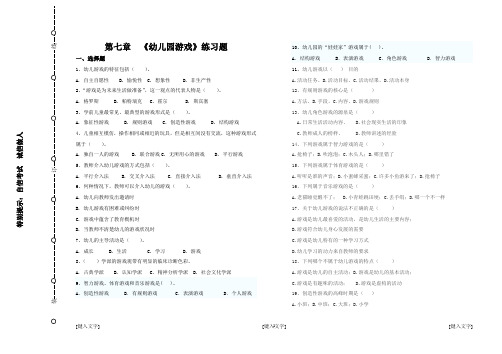
特别提示:自信考试 诚信做人第七章 《幼儿园游戏》练习题一、选择题1、幼儿游戏的特征包括( )。
A. 自主自愿性B. 愉悦性C. 想象性D. 非生产性 2、“游戏是为未来生活做准备”,这一观点的代表人物是( )。
A. 格罗斯 B. 帕特瑞克 C. 霍尔 D. 斯宾塞 3、学前儿童最常见、最典型的游戏形式是( )。
A. 象征性游戏B. 规则游戏C. 创造性游戏D. 结构游戏 4、儿童相互模仿,操作相同或相近的玩具,但是相互间没有交流,这种游戏形式属于( )。
A. 独自一人的游戏B. 联合游戏C. 无所用心的游戏D. 平行游戏 5、教师介入幼儿游戏的方式包括( )。
A. 平行介入法B. 交叉介入法C. 直接介入法D. 垂直介入法 6、何种情况下,教师可以介入幼儿的游戏( )。
A. 幼儿向教师发出邀请时 B. 幼儿游戏有困难或纠纷时 C. 游戏中蕴含了教育楔机时 D. 当教师不清楚幼儿的游戏状况时 7、幼儿的主导活动是( )。
A. 成长B. 生活C. 学习D. 游戏 8、( )学派的游戏观带有明显的临床诊断色彩。
A. 古典学派B. 认知学派C. 精神分析学派D. 社会文化学派 9、智力游戏、体育游戏和音乐游戏是( )。
A .创造性游戏B .有规则游戏C .表演游戏D .个人游戏10、幼儿园的“娃娃家”游戏属于( )。
A .结构游戏B .表演游戏C .角色游戏D .智力游戏 11、幼儿游戏以( ) 目的A.活动任务、B.活动目标、C.活动结果、D.活动本身 12、有规则游戏的核心是( ) A.方法、B.手段、C.内容、D.游戏规则 13、幼儿角色游戏的源泉是( )A.日常生活活动内容、B.社会现实生活的印象C.教师成人的榜样、D.教师讲述的经验 14、下列游戏属于智力游戏的是( ) A.抢椅子;B.吹泡泡;C.木头人;D.哪里错了 15、下列游戏属于体育游戏的是( )A.听听是谁的声音;B.小蜜蜂采蜜;C.许多小鱼游来了;D.抢椅子 16、下列属于音乐游戏的是( )A.老猫睡觉醒不了;B.小青蛙跳田埂;C.丢手绢;D.哪一个不一样 17、关于幼儿游戏的说法不正确的是( ) A.游戏是幼儿最喜爱的活动,是幼儿生活的主要内容; B.游戏符合幼儿身心发展的需要 C.游戏是幼儿特有的一种学习方式 D.幼儿学习的动力来自教师的要求18、下列哪个不属于幼儿游戏的特点( ) A.游戏是幼儿的自主活动;B.游戏是幼儿的基本活动; C.游戏是有趣味的活动; D.游戏是虚构的活动 19、创造性游戏的高峰时期是( ) A.小班;B.中班;C.大班;D.小学特别提示:自信考试 诚信做人20、幼儿期最典型、最有特色的一种游戏是( ) A.角色游戏;B.结构游戏;C.体育游戏;D.智力游戏 21、( )班幼儿角色意识强烈,往往争当同一角色。
30个练习题及答案

30个练习题及答案1. 题目:什么是光合作用?答案:光合作用是植物、藻类和某些细菌利用光能将水和二氧化碳转化为葡萄糖和氧气的过程。
2. 题目:地球的自转周期是多少小时?答案:地球的自转周期是24小时。
3. 题目:水的化学式是什么?答案:水的化学式是H2O。
4. 题目:人体最大的器官是什么?答案:人体最大的器官是皮肤。
5. 题目:什么是牛顿第三定律?答案:牛顿第三定律指出,对于每一个作用力,总有一个大小相等、方向相反的反作用力。
6. 题目:什么是细胞分裂?答案:细胞分裂是细胞复制自身的过程,分为有丝分裂和无丝分裂两种类型。
7. 题目:什么是基因?答案:基因是遗传信息的基本单位,由DNA序列组成,控制生物体的性状。
8. 题目:什么是生态系统?答案:生态系统是由生物群落和其非生物环境相互作用形成的自然系统。
9. 题目:什么是相对论?答案:相对论是描述物体在高速运动或强引力场中行为的物理理论,由爱因斯坦提出。
10. 题目:什么是光的折射?答案:光的折射是指光在不同介质之间传播时,速度和方向发生变化的现象。
11. 题目:什么是氧化还原反应?答案:氧化还原反应是涉及电子转移的化学反应,其中一种物质被氧化,另一种物质被还原。
12. 题目:什么是电磁波?答案:电磁波是由变化的电场和磁场组成的波,包括无线电波、可见光、X射线等。
13. 题目:什么是原子?答案:原子是构成物质的基本单位,由原子核和电子组成。
14. 题目:什么是热力学第一定律?答案:热力学第一定律,也称为能量守恒定律,表明能量不能被创造或销毁,只能从一种形式转换为另一种形式。
15. 题目:什么是牛顿第二定律?答案:牛顿第二定律指出,物体的加速度与作用在其上的净外力成正比,与物体的质量成反比。
16. 题目:什么是光年?答案:光年是光在一年时间内在真空中行进的距离,是天文学中常用的距离单位。
17. 题目:什么是细胞呼吸?答案:细胞呼吸是细胞将营养物质转化为能量的过程,主要通过糖酵解、三羧酸循环和氧化磷酸化进行。
第三章习题

(3)80%A合金如图③: 合金在1点以上全部为液相,冷至1点时开始从液相中析出 A,此时液相线成分沿AE线变化,冷至2点时,液相线成 分到达点,发生共晶反应,形成(A+α)共晶体,因而合金 ③的室温组织:A+ (A+α) 相组成物:A+α
组织:A+α=(20-0)/(40-0)=50% A=1-50%=50% 相:A=(90-20)/(90-0)=78% α=1-A%=22%
(2)45%A合金如图②: 合金在1点以上全部为液相,冷至1点时开始从液相中析出 α固溶体,此时液相线成分沿线BE变化,固相线成分沿 BD线变化,当冷至2点时,液相线成分到达E点,发生共 晶反应,形成(A+α)共晶体,合金自2点冷至室温过程 中,自中析出二次相AⅡ,因而合金②室温组织:
AⅡ+α+(A+α) 相组成物:A+α 组织: A+α=L= (70-55)/(70-40)=50% 300 ℃时,α=(55-40)/(70-40)=50% 室温时, AⅡ=(90-55)/90*50%=19.4% α=1- 50%-19.4%=30.6% 相:A=(90-55)/90*100%=39% α=1-A%=61%
2. 已知A(熔点 600℃)与B(500℃) 在液态无限互溶;在固 态 300℃时A溶于 B 的最大溶解度为 30% ,室温时为10%, 但B不溶于A;在 300℃时,含 40% B 的液态合金发生共晶 反应。现要求: 1)作出A-B 合金相图;
答:1)
2)分析 20% A,45%A,80%A 等合金的结晶过程,并确定室 温下的组织组成物和相组成物的相对量。 答:(1)20%A合金如图①: 合金在1点以上全部为液相,当冷至1点时,开始从液 相中析出α固溶体,至2点结束,2~3点之间合金全部由α固 溶体所组成,但当合金冷到3点以下,由于固溶体α的浓度 超过了它的溶解度限度,于是从固溶体α中析出二次相A, 因此最终显微组织: α+AⅡ 相组成物: α+A A=(90-80)/90*100%=11% α=1-A%=89%
100道练习题,带答案

100道练习题,带答案选择题1.下面哪个命令是用于三维操作的:Align Extrude Rotate Union2.为了符合国家标准要求,AutoCAD标注样式设置中新建了哪几种样式: 半径标注角度标注直径标注以上三种.利用以下哪些方法可以调用命令?在命令提示区输入命令单击工具栏上的按纽选择下拉?a href=“http:///fanwen/shuoshuodaquan/” target=“_blank” class=“keylink”>说ブ械牟说ハ?D) 以上均可4.Auto CAD006软件中有一种新的窗体,它就是选项板,在主界面中它可以: 隐藏固定隐藏和固定以上均可.样板文件的扩展名是什么?BAK SV$ DWT DWG.采用固定的国家和地方标准,应该使用:缺省设置使用样板“启动”对话框中的”简介” 使用向导.在给定直线的第一点后,下面哪一个相对坐标输入法能画出45°线? @0 9.建立文字”6个φ15的孔”要输入的内容是:-%%C1×15%%D -%%D1×%%C110.在插入块之前,必须先进行:确定块的插入点确定块的名称建立组成块的对象上述各条 11.对不同图层上的对象作倒直角,则新生成的棱边位于: 0层当前层选取的第一实体所在层另一层 12.下面哪个命令可以获得线段的长度?Status ID List Area13.标注尺寸的极限偏差时,我国的偏差对齐方式为:None Top Middle Bottom14.画一个圆与三个实体相切,应使用Circle命令的哪个选项?Points Tan,Tan,Radius Tan,Tan,Tan Center,Direction 15.所谓内接多边形是:多边形在圆外,多边形边的中点在圆上多边形在圆内,多边形的顶点在圆上多边形在圆外,多边形的顶点在圆上多边形在圆内,多边形边的中点在圆上 16.哪种坐标输入法需要使用@符号:极坐标绝对坐标相对坐标柱坐标 17.关于冻结图层,哪个说法是正确的: 该图层上的图形对象可见,能打印输出,不能修改该图层上的图形对象不可见,不能打印输出,不能修改该图层上的图形对象在图形重新生成时要计算与关闭图层完全一样18.以下哪条命令不可以当作透明命令使用:Zoom Pan Regen Dsviewer 19.建立文字”20±0.1”,可以键盘输入以下内容:0±0.1 0%%p0.1 0+ -0.1 0%%d0.120.在引线命令中,想画出不带箭头的注释线,应在格式选项中选择: Spline Straight None Arrow None21.对于任何一个图形,想将它存为样板图:不一定能存为样板图将其存成扩展名为.tem文件即可将其存成扩展名为.dwt文件即可将其存成扩展名为.dwg文件即可2.在构造选择集时,将已选中的对象移出,应输入: CP L A R23.调用Plot命令输出一幅图形时,可以:在命令行输入Plot命令在File菜单中选择Print 在命令行输入Print命令以上都对24.下列哪一个命令是用来显示选定对象的数据信息的: List Dist Area Status25.下面哪个命令可以使三维实体模型的显示最具有真实感?消隐重画渲染着色26.下面哪个命令可以使某三维实体相对于另一三维实体的位置产生变化? Insert Extrude Align Subtract27.在进行文字样式设置时,我国国家标准要求汉字的宽度比例约为: 0.5 0. 1 1.28.重复执行上一个命令的最快方法是:按Shift健按Esc健按回车健按F8健29.在进行标注样式设置时,我国国家标准要求尺寸界线的超出长度约为: ~8mm ~8mm ~5mm ~5mm0.特性刷可以复制什么特性:有层、线型、颜色和厚度有层、线型、颜色和线型比例有线型、颜色、线型比例和厚度有层、线型、颜色、线型比例和厚度1.哪一个工具栏中有颜色列表?标准工具栏对象特性工具栏绘图工具栏修改工具栏2.在给定直线的第一点后,下面哪一个相对坐标输入法能画出8个单位长的垂直线?@90 Endpoint Center Midpoint Quadrant4.在Stretch命令中创建有效的选择集的方法为:窗交或圈交窗交、圈交或隐含的窗交窗口、窗交或圈交所有5.剖面线的夹点位于是:对象的外部插入点坐标原点对象的外接矩形中心6.分解剖面线后,其原对象将变为:块直线段多义线直线和圆弧37.在进行标注样式设置时,我国国家标准要求尺寸箭头的长度约为粗实线的: 倍 ~6倍倍 ~8倍8.哪个命令用于建立块的定义?Insert WBlock ByBlock BMake9.下面哪一角度不用于旋转图形文件?180 0 00.所谓外切多边形是:多边形在圆外,多边形的各边与圆相切多边形在圆心多边形在圆外,多边形的顶点在圆上多边形在圆上1.机电工程CAD图样中,粗细线型的宽度比率一般采用的是: :1 :1 :2:1 :12.我国机电工程CAD图样中,图层标识号是用:拉丁字母罗马字母数字汉字3.已知字体的高度为h,工程图样中右上角”其余”两字的高度约为: 1.414h 1h 0.707h 0.5h4.在A3图纸上作图时,字体的大小应选择:..45.我国机电工程CAD图样中,粗实线在屏幕上的颜色是:白色红色黄色绿色46.在绘图过程中,若虚线、粗实线、双点画线、细点画线重合时,优先画出的顺序是: 虚线、粗实线、双点画线、细点画线粗实线、虚线、细点画线、双点画线双点画线、粗实线、细点画线、虚线细点画线、虚线、双点画线、粗实线7.在尺寸标注设置中,尺寸线、尺寸界线、文字的默认颜色是: 随块随层白色黑色8.进行尺寸标注时,注出的尺寸应该在:0层当前层尺寸层实体所在层9.当文件名已被指定,要即时存储文件,使用的命令是? Save Save As QSave PSave0.用层列表不能进行下面哪个操作?打开一个层冻结一个层把锁定的层解锁改变一个层的颜色 1.绘图窗口的缺省色为?白色红色黄色黑色2.绘制二维图时,常用的对象捕捉点是:端点、中点、圆心、交点端点、中点、圆心、切点端点、圆心、交点、切点端点、中点、交点、切点3.二维图中,圆弧的夹点是:端点、圆心、象限点中点、圆心、象限点端点、象限点、中点端点、中点、圆心4.文字的缺省对齐方式是:中心中间左右55.进行单位设置时,若选择小数制、精度为3位小数,状态行的坐标值显示为: 1.253E+01 1.253” 1.253 1.21/456.进行单位设置时,若0°为东、角度测量为逆时针方向,90°角将在何方向上? 东西南北7.绘制轴线或对称中心线时,其两端超出图形的长度应控制在? ~3~5~ ~88.绘制圆心符号,在下面哪个工具栏中调用命令?绘图修改标注实体9.复制命令的快捷命令名是:COPY CY C CO0.绘制轴线和对称中心线所用的线型名是:ACAD_ISO02W100 ACAD_ISO03W100 ACAD_ISO04W100 ACAD_ISO05W10061.现有两条相互倾斜的直线段,但不相交,若使之相交,其具体操作是: Move Copy, Erase Rotate 以上均可2.尺寸标注样式中,不存在的文本对齐方式是:水平垂直 ISO标准与尺寸线对齐 3. 在AutoCAD中,标准颜色一共有几种?104.AutoCAD文本样式中,缺省的字体名是:gbeitc.shx gbcbig.shx dxt.shx txt.shx65.标注半径尺寸时,如果尺寸界线之间没有足够空间同时放置文字和箭头,那么首先从尺寸界线之间移出的是: 箭头文字文字和箭头文字或箭头,取最佳效果6.用三维基本实体命令创建一圆柱筒,其创建理念是: 创建2个等长不等径的圆柱再求并创建2个等长不等径的圆柱再求差创建2个等长不等径的圆柱再求交以上均可67.采用用户定义的方式绘制剖面符号时,需要编辑的是:角度和比例比例和间距角度和间距以上均可8.绘制“6×φ15EQS”孔的阵列方式是:矩形阵列环形阵列正六边形阵列以上均可9.使用AutoCAD006版本时,在绘图窗口中双击三键鼠标中键是:实时缩放窗口缩放范围缩放缩放为原窗口0.利用夹点编辑对象时,能进行编辑操作的夹点是:冷点温点热点以上均可1.操作镜像命令时, 镜像线是:虚拟的现实的直线直线段2.调用旋转命令时, 其基点指的是:中心点中间点中点旋转中心3.利用二维封闭对象创建三维实体,其图形是指基本形体的?主视图局部视图剖视图特征视图4.不能用于创建三维实体的二维对象是?面域多边形块二维多段线75.操作拉长命令时, 若使直线段的长度增加一倍,选择的操作方式是: DE P T DY6.要把一对象修改到指定层,可使用?图层列表颜色列表线型列表线宽列表7.在一对象上要捕捉靠近靶框中心的点,可使用对象捕捉工具栏中点? 端点交点中点最近点8.确定定长直线段第二点最简单的数据输入方法是?输入直角坐标输入极坐标定向输入距离用鼠标拾取点9.操作修剪命令时, 第一批选中的对象可以是: 被切边和延伸边界剪切边和延伸边界被切边和剪切边以上都是0.操作三维实体剖切命令的实质是: 用平面剖切用曲面剖切用实体剖切以上都是1.尺寸线应平行于被标注的线段,其间隔及两平行的尺寸线间的间隔应:斜线斜线和箭头圆点和箭头箭头3.绘制圆时,当对称中心线不能相交的线段上,应该进行?补画线段标注尺寸标注圆心符号以上均可4.要注写图形左方和上方的表面粗糙度代号,在定义其参数值成块的属性且拾取符号中横线的中点作为块的属性时,文字的对齐方式是:中心中间中上中下85.要注写图形左方和上方的表面粗糙度代号,在定义其参数值成块的属性且拾取符号中横线的中点作为块的属性时,文字的旋转角度是:0 0 180 7086.要同时标注公差带代号和极限偏差数值时,必须在标注极限偏差数值这种形式的基础上再进行哪些命令操作,方可实现?复制、分解、移动复制、分解、修改文字分解、移动、修改文字分解、复制、修改文字87.标注形位公差时,带箭头的指引线与尺寸线对齐,表示被测要素为: 轴线对称面球心以上均可8.要想得到三维实体某截断面的断面图,在实体工具栏中选用哪个命令? 拉伸旋转剖切切割9.下面哪一个命令不是三维操作命令?三维拉伸三维旋转三维阵列三维镜像0.样条曲线可以绘制?波浪线二维封闭对象拉伸路径以上均可91. 在AutoCAD下拉菜单栏中有11个菜单组,在每个菜单组中还有若干条是: 菜单菜单条菜单键菜单项2. AutoCAD界面中,显示的栅格点是:图形的一部分,出图时输出参照点,迫使光标停在特定的位置上定位时的虚拟参照点以上都不对93. 安装且首次运行AutoCAD软件,主界面上显示的工具栏被称为: 标准工具栏修改工具栏绘图工具栏初显工具栏94. 用Pline命令画完图后,再将此图分解,屏幕中显示的线宽是: 设定值默认值输入值指定值95. 用Pline命令画图时,欲绘出一段指定宽度的图线,用户需键入: L H W A6. 进行图案填充时,所得图案:颜色和线型都反映当前图层的设置颜色反映当前图层的设置,线型为细实线线型反映当前图层的设置,颜色为白色颜色和线型都与当前图层的设置无关7. 下列哪个命令将块生成图形文件:Save As Explode Block Wblock8. Purge命令用于:减少图形文件磁盘存储空间存储图形文件创建新图形删除图形9. AutoCAD屏幕下方的状态栏中的”ORTHO”用于:将光标的移动限定在水平方向上将光标的移动限定在垂直方向上将光标的移动限定在水平和垂直方向上将光标的移动限定在间隔捕捉点上 100. Divide命令不能等分的对象是: 线段圆圆弧块答题卡姓名:班级:学号:图形推理专项习题100道1.23.4.5.6.7.8.9.10.11.12.13.14.15.16. 将下面左图进行折叠后,得到的图形是17.18.19.20.21.22.23.24.25.26.。
100道数学练习题

1.哥哥4个苹果,姐姐有4个苹果,弟弟有5个苹果,哥哥给弟弟1个后,弟弟吃了3个,这时谁的苹果多?2.小明今年6岁,小强今年4岁,3年后,小明比小强大几岁?3.同学们排队做操,小明前面有4个人,后面有4个人,这一队一共有多少人?4.有一本书,小华第一天看了2页,以后每一天都比前一天多看2页,第4天看了多少页?5.同学们排队做操,从前面数,小明排第4,从后面数,小明排第5,这一队一共有多少人?6.有18个皮球,如果男生每人发一个,就多2个,如果女生每人发一个,就少2个,男生有多少人,女生有多少人?7.老师给19个三好生每人发一朵花,还多出1朵红花,老师共有多少朵红花?8.有5个同学投沙包,老师如果发给每人2个沙包就差1个,老师共有多少个沙包?9.刚刚有9本书,爸爸又给他买了5本,小明借去2本,刚刚还有几本书?10.一队小学生,李平前面有8个学生比他高,几个学生比他矮,这队小学生共有多少人?11.小林吃了8块饼干后,小林现在有4块饼干,小林原来有多少块饼干?12.哥哥送给弟弟5支铅笔后,还剩6支,哥哥原来有几支铅笔?13.第二中队有8名男同学,女同学的人数跟男同学同样多,第二中队共有多少名同学?14.大华和小刚每人有10张画片,大华给小刚2张后,小刚比大华多几张?15.猫妈妈给小白5条鱼,给小花4条鱼,小白和小花共吃了6条,它们还有几条?16.同学们到体育馆借球,一班借了9只,二班借了6只。
体育馆的球共减少了几只?17.明明从布袋里拿出5个白皮球和5个花皮球后,白皮球剩下10个,花皮球剩下5个。
布袋里原来有多少个白皮球,多少个花皮球?18.芳芳做了14朵花,晶晶做了8朵花,芳芳给晶晶几朵花,两人的花就一样多?19.妈妈买回一些鸭蛋和12个鸡蛋,吃了8个鸡蛋后,剩下的鸡蛋和鸭蛋同样多,问妈妈一共买回几个蛋?20.草地上有10只羊,跑走了3只白山羊,又来了7只黑山羊,现在共有几只羊?21.冬冬有5支铅笔,南南有9支铅笔,冬冬再买几支就和南南的一样多?22.小平家距学校2千米,一次他上学走了1千米,想起忘带铅笔盒,又回家去取。
小学数学试题练习题库

小学数学试题练习题库一、数的认识1. 请问5的平方是多少?2. 请问1000除以10等于多少?3. 请问3.14的平方根是多少?4. 请问0.25的小数点向右移动两位是多少?5. 请问1/2等于多少?二、加减法6. 请问7加5等于多少?7. 请问10减去3等于多少?8. 请问9加8等于多少?9. 请问100减去50等于多少?10. 请问5加5减去2等于多少?三、乘除法11. 请问3乘以4等于多少?12. 请问8除以2等于多少?13. 请问6乘以6等于多少?14. 请问10除以5等于多少?15. 请问4乘以7除以2等于多少?四、分数和小数16. 请问1/4等于多少小数?17. 请问0.75等于多少分数?18. 请问1/2加上1/4等于多少?19. 请问3/4减去1/2等于多少?20. 请问2/3乘以4/5等于多少?五、几何21. 请问一个正方形的面积是多少,如果它的边长是4厘米?22. 请问一个圆的半径是5厘米,它的面积是多少?23. 请问一个长方形的长是10厘米,宽是5厘米,它的面积是多少?24. 请问一个三角形的底是6厘米,高是4厘米,它的面积是多少?25. 请问一个立方体的体积是多少,如果它的边长是3厘米?小学数学试题练习题库一、数的认识1. 请问5的平方是多少?2. 请问1000除以10等于多少?3. 请问3.14的平方根是多少?4. 请问0.25的小数点向右移动两位是多少?5. 请问1/2等于多少?二、加减法6. 请问7加5等于多少?7. 请问10减去3等于多少?8. 请问9加8等于多少?9. 请问100减去50等于多少?10. 请问5加5减去2等于多少?三、乘除法12. 请问8除以2等于多少?13. 请问6乘以6等于多少?14. 请问10除以5等于多少?15. 请问4乘以7除以2等于多少?四、分数和小数16. 请问1/4等于多少小数?17. 请问0.75等于多少分数?18. 请问1/2加上1/4等于多少?19. 请问3/4减去1/2等于多少?20. 请问2/3乘以4/5等于多少?五、几何21. 请问一个正方形的面积是多少,如果它的边长是4厘米?22. 请问一个圆的半径是5厘米,它的面积是多少?23. 请问一个长方形的长是10厘米,宽是5厘米,它的面积是多少?24. 请问一个三角形的底是6厘米,高是4厘米,它的面积是多少?25. 请问一个立方体的体积是多少,如果它的边长是3厘米?六、时间26. 请问5小时等于多少分钟?27. 请问1天等于多少小时?28. 请问1周等于多少天?29. 请问1年等于多少个月?七、货币31. 请问1元等于多少角?32. 请问1角等于多少分?33. 请问5元加2元等于多少元?34. 请问10元减去5元等于多少元?35. 请问2元乘以3等于多少元?八、重量36. 请问1千克等于多少克?37. 请问1克等于多少毫克?38. 请问5千克加2千克等于多少千克?39. 请问10千克减去5千克等于多少千克?40. 请问2千克乘以3等于多少千克?小学数学试题练习题库一、数的认识1. 请问5的平方是多少?2. 请问1000除以10等于多少?3. 请问3.14的平方根是多少?4. 请问0.25的小数点向右移动两位是多少?5. 请问1/2等于多少?二、加减法6. 请问7加5等于多少?7. 请问10减去3等于多少?8. 请问9加8等于多少?10. 请问5加5减去2等于多少?三、乘除法11. 请问3乘以4等于多少?12. 请问8除以2等于多少?13. 请问6乘以6等于多少?14. 请问10除以5等于多少?15. 请问4乘以7除以2等于多少?四、分数和小数16. 请问1/4等于多少小数?17. 请问0.75等于多少分数?18. 请问1/2加上1/4等于多少?19. 请问3/4减去1/2等于多少?20. 请问2/3乘以4/5等于多少?五、几何21. 请问一个正方形的面积是多少,如果它的边长是4厘米?22. 请问一个圆的半径是5厘米,它的面积是多少?23. 请问一个长方形的长是10厘米,宽是5厘米,它的面积是多少?24. 请问一个三角形的底是6厘米,高是4厘米,它的面积是多少?25. 请问一个立方体的体积是多少,如果它的边长是3厘米?六、时间26. 请问5小时等于多少分钟?28. 请问1周等于多少天?29. 请问1年等于多少个月?30. 请问1小时等于多少秒?七、货币31. 请问1元等于多少角?32. 请问1角等于多少分?33. 请问5元加2元等于多少元?34. 请问10元减去5元等于多少元?35. 请问2元乘以3等于多少元?八、重量36. 请问1千克等于多少克?37. 请问1克等于多少毫克?38. 请问5千克加2千克等于多少千克?39. 请问10千克减去5千克等于多少千克?40. 请问2千克乘以3等于多少千克?九、长度41. 请问1米等于多少厘米?42. 请问1厘米等于多少毫米?43. 请问5米加2米等于多少米?44. 请问10米减去5米等于多少米?45. 请问2米乘以3等于多少米?十、百分比46. 请问50%等于多少小数?47. 请问0.25等于多少百分比?48. 请问1/4加上1/2等于多少百分比?49. 请问3/4减去1/2等于多少百分比?50. 请问2/3乘以4/5等于多少百分比?。
数据库理论习题(答案)
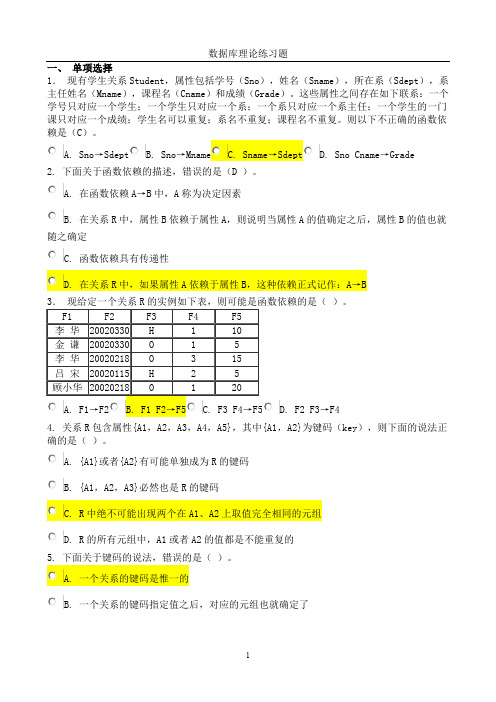
数据库理论练习题一、单项选择1.现有学生关系Student,属性包括学号(Sno),姓名(Sname),所在系(Sdept),系主任姓名(Mname),课程名(Cname)和成绩(Grade)。
这些属性之间存在如下联系:一个学号只对应一个学生;一个学生只对应一个系;一个系只对应一个系主任;一个学生的一门课只对应一个成绩;学生名可以重复;系名不重复;课程名不重复。
则以下不正确的函数依赖是(C)。
A. Sno→Sde ptB. Sno→MnameC. Sname→SdeptD. Sno Cname→Grade2. 下面关于函数依赖的描述,错误的是(D )。
A. 在函数依赖A→B中,A称为决定因素B. 在关系R中,属性B依赖于属性A,则说明当属性A的值确定之后,属性B的值也就随之确定C. 函数依赖具有传递性D. 在关系R中,如果属性A依赖于属性B,这种依赖正式记作:A→B)。
A. F1→F2B. F1 F2→F5C. F3 F4→F5D. F2 F3→F44. 关系R包含属性{A1,A2,A3,A4,A5},其中{A1,A2}为键码(key),则下面的说法正确的是()。
A. {A1}或者{A2}有可能单独成为R的键码B. {A1,A2,A3}必然也是R的键码C. R中绝不可能出现两个在A1、A2上取值完全相同的元组D. R的所有元组中,A1或者A2的值都是不能重复的5. 下面关于键码的说法,错误的是()。
A. 一个关系的键码是惟一的B. 一个关系的键码指定值之后,对应的元组也就确定了C. 关系R的键码的任何真子集都不可能是关系R的键码D. 在保存学生学籍信息处的关系,学生姓名对应的属性不适合单独作为键码)。
A. {F1}B. {F3}C. {F1D. {F4}7. 已知关系R包含属性{A,B,C,D},R的键码为{A,B},则下面的选项哪一个是R的超键码()。
A. {A}B. {C,D}C. {A,B,C,D}D. {B,C,D}8. 已知关系R包含属性A1,A2,…,An,R只有键码为{A1,A2},则R的超键码有多少个()。
- 1、下载文档前请自行甄别文档内容的完整性,平台不提供额外的编辑、内容补充、找答案等附加服务。
- 2、"仅部分预览"的文档,不可在线预览部分如存在完整性等问题,可反馈申请退款(可完整预览的文档不适用该条件!)。
- 3、如文档侵犯您的权益,请联系客服反馈,我们会尽快为您处理(人工客服工作时间:9:00-18:30)。
Part I : True or False , Please write the answer in the form below.1 Frederick Taylor's efforts marked the beginning of the Systems Approach.TrueFalse2 The three most common management roles are interpersonal roles, information-related roles, and decision-making roles.TrueFalse3 A hypothesis is an idea about the way something works, whereas a principle is a basic truth or law.TrueFalse4 In the interpersonal communication process, an initial message is sent from the sender to the receiver.TrueFalse5 Instead of asking a receiver to explain what he or she has heard, it is much better to aska person if he or she understands the message.TrueFalse6 Most business decisions in today's organizations are made under conditions of certainty. TrueFalse7 Creativity refers to doing new things, whereas innovation refers to coming up with a new idea.TrueFalse8 Contingency planning is mostly necessary when a company is in a stable environment. TrueFalse9 A mission defines the basic purpose or purposes of the organization.TrueFalse10 A rule is a series of related steps or tasks expressed in chronological order for a specific purpose.TrueFalse11 Power is the ability to influence, command, or apply forceTrueFalse12 The trend in today's organizations is towards more centralizationTrueFalse13 Flextime allows employees to choose, within certain limits, when they start and end their workdays.TrueFalse14 In a line organization, authority originates at the top and moves downward in a line. TrueFalse15 The halo effect occurs when the interviewer allows a single prominent characteristic to dominate judgement of all other traitsTrueFalse16 The causation sequence for motivation is: Needs >> Drives or motives >> Achievement of goals.TrueFalse17 The expectancy approach states that an employee's level of motivation depends on three basic beliefs: expectancy, instrumentality, and valence.TrueFalse18 Satisfaction and motivation are synonymous.TrueFalse19 A theory Y leader would likely use a much more authoritarian style of leadership than a theory X leader.TrueFalse20 A leader that makes most decisions for the group is a democratic leaderTrueFalse21 When practicing control, the manager must be able to balance stability and objective realization.TrueFalse22 A control tolerance is any variance from the standard that is unacceptable to the manager.TrueFalse23 Informational controls are the top level of the control pyramid TTrueFalse24 Behavior control and output control are substitutes for each other TTrueFalsePartⅡChoice, Please write the answer in form below1 Directing and channeling human behavior toward the accomplishment of objectives is which of the following?ControllingPlanningOrganizingStaffingLeading2 __________ skills help a manager understand how different parts of a business relate to one another and to the business in general.Human relationsConceptualEntrepreneurialTechnicalLeadership3 Operating a word process system and designing a brochure are examples of:technical skillsconceptual skills.managerial skillsstrategy implementation skillshuman relations skills4 _____________ is the process of drawing a general conclusion from specific examples. ObservationConcludingGuessworkHypothesizingDeduction5 An emphasis on specialization and division is part of which approach?Scientific management approachTotal quality management approachSystems approachProcess approachHuman relations approach6 The invisible barrier that prevents women and minorities from moving up in business is commonly referred to as the:road blockvisible wallpoint of no returnglass ceilingcorporate barricade7 Which of the following is NOT one of Fayol's 14 principles of management?Division of workAuthorityUnity of commandQuality controlRemuneration8 Which approach to management focuses on the functions of planning, controlling, organizing, staffing, and leading?The Systems approachThe Human Relations approach.The Scientific Management approach.The Process approachThe Management Theory Jungle approach.9 Which method attempts to integrate American and Japanese management practices? The Contingency approachTotal quality managementTheory ZThe Systems approachThe Human Relations approach10 ___________ was the first person to identify planning, organizing, commanding, coordinating, and controlling as the functions of management.Henry DennisonMary Parker FollettFrederick W. TaylorFrank GilbrethHenri Fayol11 is the act of exchanging information.ParalanguageFeedbackCommunicationListeningSpeaking12 Which of the following is NOT a reason why communication is an important management skill?Managers must give direction to the people who work for them.Managers must be able to motivate people.Managers must be able to convince customers that they should do business with them. Managers must override the ideas of others.Managers must be able to persuade other people13 is an interactive process between individuals that involves sending and receiving verbal and nonverbal messages.ParalanguageFeedbackInterpersonal communicationActive listeningGrapevine communication14 Which of the following is NOT a cause of interpersonal communication failure?Conflicting assumptionsToo much feedbackInadequate communication skillsDifferent interpretations of the meaning of wordsDifferences in perception15 To communicate effectively, managers need to answer all of the following questions EXCEPT:What does the audience already know?What does the audience want to know?What is its capacity for absorbing information?Is the audience friendly or hostile?Are members of the audience personally acquainted with the speaker?16 is absorbing what another person is saying and responding to the person's concerns. FeedbackPerceptionActive listeningPassive listeningParalanguage17 Feedback is the flow of information:from the sender to the receiver.from the receiver to the sender.between two message senders.between two message receivers.that occurs nonverbally between two individuals.18 Pitch, tempo, loudness, and hesitations in verbal communications are examples of: body language.paralanguage.semantics.Feedbackperception.19 Principles of Good Writing include writing as simply and clearly as possible, making sure that tone and content are appropriate for the audience, and:proofreading the document.including technical terms to appear more smart.keeping sentences long.using unrestrained, emotional language.using jargon and slang20 Which of the following is NOT a rule of thumb for improving oral communication skills? Address listeners by name whenever possible.Avoid interrupting others.Always be courteous.Avoid empty sounds or words such as "uh".Speak in a monoton21 Informal channels of communication within an organization are referred to as: Intranetsfocus groupssemanticsgrapevines.cliques.22 The design stage of the decision process entails:inventing, developing, and analyzing possible courses of action.searching the environment for conditions requiring a decision.actual selection of a course of action.gathering information on various choices.creating an MIS system that makes a decision for you.23 A decision making approach that uses some type of deductive reasoning is called a(n): risk-averting approach.intuitive approach.rational approach.irrational approachrisk-seeking approach.24 refers to selecting the first alternative that meets the decision maker's minimum standard of satisfaction.OptimizingSatisfyingSatisficingRisk avertingProblem solving25 If the weather forecaster says that there is a 40 percent chance of rain, the decision maker is operating in a situation of:certainty.RiskUncertaintyMaximaxno risk.26 is a conception, explicit or implicit, defining what an individual or a group regards as desirable.A valueCreativityInnovationBrainstormingA concept27 All of the following are rules for the first phase of brainstorming EXCEPT:no criticism is allowed.praise of ideas is allowed.no questions or discussion of ideas is allowed.combinations of ideas are encourageimprovements on ideas are encouraged.28 Which of the following is NOT one of the six stages of the Model for Creative Decision Making?Resource FindingProblem FindingIdea FindingSolution Finding29 A plan that originates from marketing, finance, or personnel is called a:short-range plancontingency planfunctional planstrategic plantactical plan.30 A __ plan is analogous to top-level long-range planning that affects many parts of the organization.Strategicshort-rangefunctionalContingencytactical31 A strategy is used when an organization is satisfied with its present course.corporatebusinessstabilityconstancyfunctional32 A strategy designed to produce and deliver the product or service at a lower cost than the competition is called:differentiation.focus.quality leadership.overall cost leadership.overall cost leadership.33 Concentration, vertical integration, and diversification are examples of:corporate strategies.growth strategies.defensive strategiescombination strategies.stability strategies.34 The strategic plan is monitored, evaluated, and updated in which phase of the strategic management process?ImplementationEvaluationAppraisalMaintenance35 _ are statements outlining what the organization is trying to achieve, and give an organization and its members direction.PoliciesStrategiesFormal plansFunctional plansObjectives36 _ are broad, general guides to action that constrain or direct the attainment of objectives.ProceduresPoliciesObjectivesStrategiesRules37 A SWOT analysis includes all of the following EXCEPT:Strengthsweaknesses.opponents.OpportunitiesThreats38 Which of the following is NOT part of the Five Forces Model of Competition?Threat of entry by potential competitorsThreat of substitute productsRivalry among established firmsBargaining power of suppliersBargaining power of competitors39 _ is a form of centralization that involves giving subordinates substantial authority to make decisions.ResponsibilityAccountabilityDelegationEmpowermentFlextime40 Which principle states that authority and responsibility coincide?Parity principleException principleUnity of command principleSpan of management principleScalar principle41 The number of subordinates that a manager can effectively manage is called:the exception principle.the span of management.unity of command.the scalar principleself-management42 is the framework that defines the boundaries of the formal organization and within which the organization operates.Organizational structureStrategy formulationProcess managementOutsourcingDepartmentation43 The practice of subcontracting information systems work to an independent outside source is called:ExportingLicensingFranchisingSubcontractingOutsourcing44 Functions directly involved in producing and marketing the organization's goods and services are called:staff functionsmatrix functionsline functionsproduct functionsvirtual functions45 Human resource attempts to determine the future human resource needs of the organization in light of its objectives.predictingforecastingtransitionplanning46 Which interview technique is being used when a prospective employee is placed in action situations that might be encountered on the job?Semi-structured interviewSituational interviewCircumstantial interviewCase interviewStress interview47 deals with what activates human behavior, what directs this behavior toward a particular goal, and how this behavior is sustained.ReinforcementValenceEnrichmentMotivationEquity48 is based on the idea that people want to be treated fairly in relationship to others. The fairness approachEquity theoryThe expectancy approachReinforcement theoryThe motivation-maintenance49 Who developed the hierarchy of needs?B. F. SkinnerFrederick HerzbergDavid C. McClellandFrederick W. TaylorAbraham Maslow50 A measure of a person's potential to get others to do what he or she wants them to do, as well as to avoid being forced by others to do what he or she does not want to do is called: LeadershipAuthorityResponsibilityPowerequity.51 ______ is the right to issue directives and expend resources.ConsiderationResponsibilityLeadershipAuthority52 It has generally been found that, if a manager's expectations are high, productivity is likely to be high. This phenomenon refers tothe path-goal theorycountry club managementthe self-fulfilling prophecyY theoryorganizational man management53 Which of the following is a Theory X assumption?The average human being has an inherent dislike of workThe expenditure of physical and mental effort in work are as natural as play or rest Commitment to objectives is a function of the rewards associated with their achievement. The average human being learns not only to accept but to seek responsibilityUnder the conditions of modern industrial life, the intellectual potentialities of the average human being are only partially utilized54 What type of leader allows people within the group to make all decisions?Autocratic leaderDemocratic leaderSocialist leaderLaissez-faire leaderQuid-pro-quo leader55 Which of the following is NOT one of the five management styles on the Managerial Grid? Authority-Obedience ManagementImpoverished ManagementOrganizational Man ManagementTeam ManagementGolf Course Management56 The ________________ theory of leadership attempts to define the relationships between a leader's behavior and the subordinates' performance and work activities. TransformationalServantTraitSituationalPath-goal57 Which of the following is NOT a leader behavior in path-goal theory?Autocratic leadershipParticipative leadershipSupportive leadershipTransactional leadershipRole classification leadership58 ________________ is the process of ensuring that organizational activities are going according to plan.ControlFeedbackSupportMonitoringRegulation59 To manage control, a manager should do any of the following EXCEPT:customize outputs.appraise employee performance.prevent crisesupdate plansprotect the organization's assets60 A system in which outputs from the system affect future inputs or future activities is called a(n):Bstandard systemfeedback system.monitoring systemcorrection systemcontrol system.61 The three requirements for the process of control are establishing standards, correcting deviancies, and:giving feedbacktesting methodsadjusting tolerancesmonitoring resultschanging responses62 A _______ is a value used as a point of reference for comparing other values.modelgaugestandardtemplatecontrol63 Tools used for correcting deviations in control should have all of the followingcharacteristics EXCEPT: BThey should be used to eliminate root causes of a problemThey should be applied piecemeal rather than totally.They should be simple and straightforward.They should be easy for employees to tie to goals or standards for improvement.They should be capable of correcting defects.64 Which of the following is NOT a level in the control pyramid?Foolproof controlAutomatic controlOperator controlCompetitor controlInformational control65 When deciding just how much control should be exercised in an organization, the three major factors that must be appraised are: (1) economic considerations, (2) flexibility and innovation considerations, and (3):competitor considerationsstructural considerationssupervisory considerationsautomatic considerations.behavioral considerations66 A control method that is based on direct, personal surveillance is called:postaction controlobservation controlbehavior controloutput controlconcurrent control.67 A method of exercising control to prevent a problem from occurring is called: preliminary controlconcurrent controlpostaction controlbehavior controloutput control。
